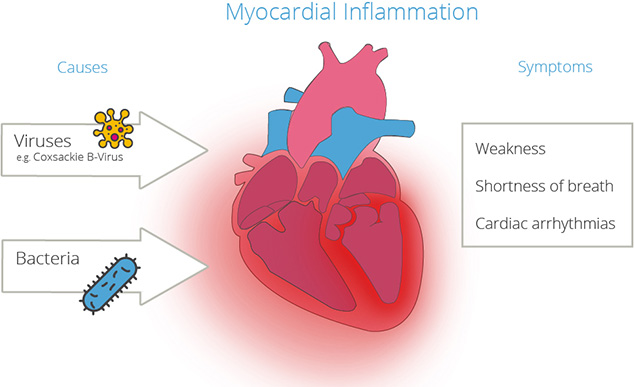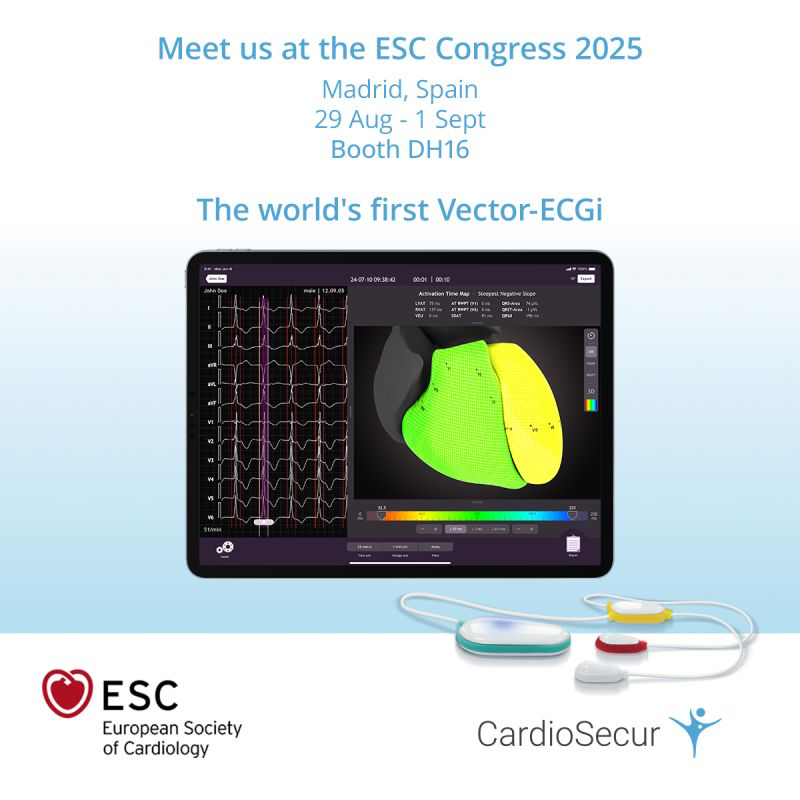Myocardial Inflammation
Heart muscle inflammation (myocarditis) is an inflammatory process of the heart muscle, which can be acute or chronic in nature. Inflammation of the pericardium (the heart sac) is known as pericarditis. When both the heart muscle and pericardium are inflamed it is called either Myo-pericarditis or Peri-myocarditis. In addition to muscle cells, tissue and blood vessels of the heart can also be affected. Heart muscle inflammation is often preceded by a viral infection and is therefore often inconspicuous. Myocarditis typically lasts for approximately six weeks. The overall health of the person affected and the degree of inflammation are both crucial factors for recovery. Additionally, it is also very difficult to say when exactly the inflammation has resolved. Myocarditis can affect people of all ages, including those with healthy hearts.
What causes heart muscle inflammation?
What are some symptoms of heart muscle inflammation?
How is heart muscle inflammation diagnosed?
What should one keep in mind regarding heart muscle inflammation?
What causes heart muscle inflammation?
Heart muscle inflammation can have various causes, either infectious or non-infectious in nature.
With infectious inflammation, the cause is due to a pathogen (a virus, bacteria or fungus). Viruses are responsible for 50% of cases, which originate from often-harmless diseases such as the common cold or a diarrheal illness. The most common cause in these situations is the Coxsackie B virus; however, Herpes and Influenza are two other viruses that also may trigger myocarditis. When heart muscle inflammation is due to a virus, the underlying virus is often not identified, as treatment with medications against the virus is usually not possible.
Infectious inflammation due to bacteria can stem from various sources such as: a blood stream infection, tonsillitis, scarlet fever or a Borrelia infection (from a tick bite). Fungal infections also can cause myocarditis. This is most commonly only found in those with an impaired immune system, which may be due to AIDS, chemotherapy or immune-modulating medications. Parasites (i.e. tapeworm) can also be a trigger for inflammation.
With non-infectious inflammation, the cause is most often a dysfunction of the immune system. The immune system reacts against bodily structures triggering diseases, such as blood vessel and connective tissue inflammation or rheumatic disorders. Myocarditis can also occur in combination with and/or be triggered by other diseases and treatments, such as radiation therapy of the chest, an autoimmune reaction or hypersensitivity to medications.
When no underlying cause can be determined, this is called idiopathic myocarditis.

What are some symptoms of heart muscle inflammation?
The symptoms of heart muscle inflammation are most often unspecific or may even be absent. When occurring in combination with a feverish illness infectious or flu-like infection, chest pain, difficulty breathing or heart rhythm disorders may be a sign of myocarditis. However, myocarditis is rarely deadly. Those affected are commonly young people, who return to sports too soon following an infection with an unnoticed myocarditis.
Acute heart muscle inflammation can occasionally lead to rapidly progressive heart failure, presenting as a degeneration of the overall state of health. Some symptoms include: difficulty breathing, a rapid heart rate, heart rhythm disturbances, pain or pressure in the chest, bluish discoloration of the skin, paleness, fluid collection in the legs, and enlargement of the spleen or liver. When present, mild physical activity can lead to severe difficulty breathing.
With chronic inflammation, the symptoms are more often unspecific and the disease presents itself as lethargy, fatigue, loss of appetite, limb pain/aching and a reduction in overall physical well-being. This may resemble a common cold, which can make the diagnosis of heart muscle inflammation difficult. As a consequence, especially when due to a cold/flu, myocarditis is often diagnosed too late or not at all. If the affected does not rest enough and begins to exercise too early, this can have serious consequences.
How is heart muscle inflammation diagnosed?
For a diagnosis, it is crucial to ask about the medical history. If heart muscle inflammation is suspected, a cardiologist will be included in the workup and management. A typical examination includes assessing the blood pressure, bodily temperature and heart rate. Blood tests can provide us with an array of information, such as: if inflammation is present, if a specific pathogen is present and if the immune system is making antibodies against something within the body.
Additionally, x-rays can also show us if the heart is enlarged. Via an echocardiograph (ultrasound of the heart), we can find out if the pump function of the heart is weakened, if the valves and heart muscle are functioning normally, if the size of the heart has changed or if fluid has collected between the heart muscle and the heart sac. This examination makes it possible to detect even the smallest amounts of fluid.
An ECG can show inflammation, as well as localize the area of the heart that is inflamed. In the setting of heart muscle inflammation, an ECG commonly shows extra beats (extrasystole) and/or an accelerated heartbeat. However, these changes may come and go; it is therefore recommended to have a long-term ECG reading performed.
In addition to an ECG, a Magnetic Resonance Imaging (MRI) with contrast can also provide information about the inflamed area of the heart. In the setting of prolonged inflammation, a cardiac catheter can remove tissue to help determine the specific cause (such as identifying the causative pathogen).
What should one keep in mind regarding heart muscle inflammation?
With heart muscle inflammation it is particularly important to rest. This pertains not only to sport/exercise, but also to daily household activities. Without sufficient rest, long-term consequences for the heart valves and muscle may arise. A physician should decide when it is permissible for a patient to return to full activity, which can be sometimes take weeks.
When heart muscle inflammation is due to bacteria, medications (antibiotics) can help in the treatment. On the contrary, inflammation due to viruses can most often not be treated with medications.
Approximately half of those affected fully recover. The other half remains with long-term side effects, such as a considerable decrease in ones overall state of health.




